Bringing clean water and sanitation
Jackie Macadam reports on Toilet Twinning and AquAid, projects seeking to bring clean water and sanitation to communities.
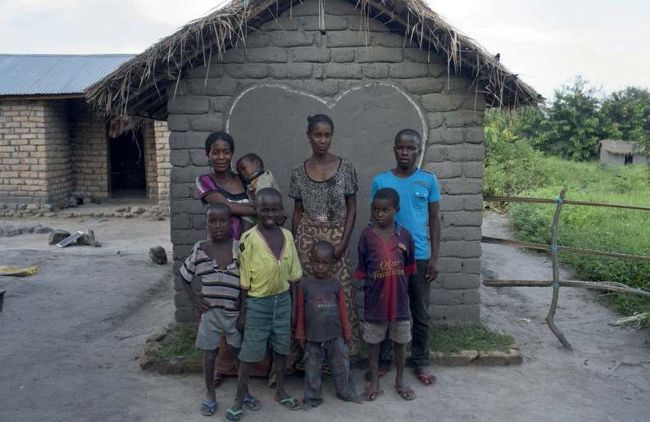
Toilets provide safety and dignity for women and girls in unstable regions of Democratic Republic of Congo.
Photo: Ralph Hodgson / Toilet Twinning
WE take it so much for granted. Going to a nice tiled loo. Flushing afterwards and washing our hands.
Most of us don’t give it a moment’s thought, but for millions of people around the world, even just that simple everyday task is fraught not just with danger on a personal and a medical level, but is actually an impossibility, because the facilities just don’t exist.
“We exist because 2.3 billion people still don’t have a safe, clean toilet and 844 million people still lack access to safe, clean drinking water”, says Lorraine Kingsley, the CEO of Tearfund’s Toilet Twinning project.
“Climate change, industry and agriculture all play their part in putting pressure on precious water resources. As water scarcity increases, all the warnings are that water will increasingly become a driver of conflict, as it already has in places such as Darfur in Sudan and Syria, according to some commentators.
“UN Water says that water scarcity already affects every continent – and global water use is rising at more than twice the rate of population increase. The worst affected areas are Asia and the Middle East.
“This situation is compounded by the fact that the amount of fresh water available to us is shrinking because of contamination caused by issues like toxic waste from rubbish dumps that seeps into the soil and rivers and factories and industry tipping chemicals into drains and waterways. Pesticides and fertilisers used in agriculture are polluting rivers and untreated sewage is still pumped into rivers and the sea.
“These issues are also true in the developing world but there is an additional problem in the communities where Toilet Twinning works: open defecation, where people have to go to the toilet in the open because they don’t have a proper toilet. It’s believed that one billion people still practise open defecation, with more than half of them (626 million people) in India, according to the World Health Organisation. This means that open water sources are easily contaminated, especially in the rainy season when human waste on the ground is more readily washed into the reservoirs and water courses where people drink and bathe.
“Likewise, in low-income countries, people have to walk for miles – 3.7 miles on average – to find water. (Generally, this is a task carried out by women and girls.)
Unprotected water sources risk being contaminated by waste or disease-carrying mosquitos which lay their eggs there”, she says.
‘I’ve seen this first hand in my travels abroad to visit Toilet Twinning projects. In Nepal, I met a man called Bishwo who had to carry his elderly mother to hospital on his back when she fell seriously ill with diarrhoea – a journey that took most of the day. The family had a toilet but it was badly built and in the wrong place, so its waste was contaminating the nearby stream which was the family’s water source. Years later, Bishwo’s daughter Mira contracted typhoid and dysentery as a teenager. She spent a month in hospital and missed a great deal of school. When our partners taught Bishwo how to build a proper toilet in the right place, he sold two of his goats to pay for the materials. He was so proud of his new loo that he invited all his neighbours to try it out! Many villagers have since built a toilet for themselves and people’s health has improved dramatically.’”
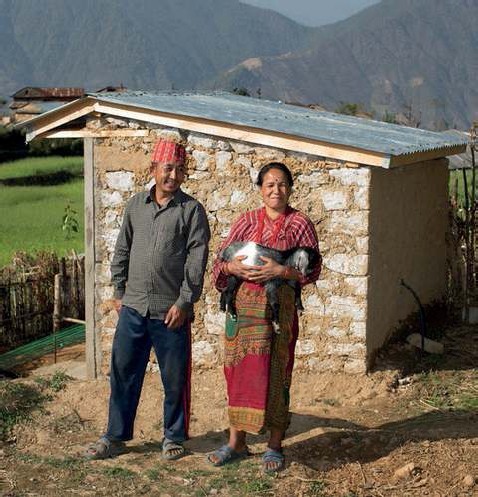
Bishwo and his wife, Uma, with their toilet in Nepal.
Photo: Ralph Hodgson / Toilet Twinning
He was so proud of his new loo that he invited all his neighbours to try it out! Many villagers have since built a toilet for themselves and people’s health has improved dramatically.
It’s not just the elderly that are affected by the lack of sanitation.
Being unable to access the loo is very much a problem that brings other issues affecting women and children into sharp relief.
“Without a toilet or clean water, people are trapped in a vicious circle of poverty, disease and sometimes debt, as Lorraine explains: ‘If you don’t have a toilet, you can’t keep clean or healthy. So you can’t work or tend your field – and you become trapped in a vicious circle. In the poor communities where we work, having something as basic as a pit latrine is literally life-changing.’
“Women and girls suffer most for lack of a loo. Without a proper toilet, they are vulnerable to attack, as well as to disease. In some countries, the dangers women face dictate that women have to wait till dark to venture out to go to the toilet.
“One young woman we helped is called Sita, and she lives on the Ivory Coast “Not long ago, the stench in Sita’s village in Ivory Coast was overpowering as there were no toilets.
“Sita’s children were constantly sick with diarrhoea and the family made regular visits to the medical centre for vital medicines they couldn’t afford. Sometimes, the nurse would give them a week’s grace to pay.
But Sita and her husband are casual labourers on the local cashew plantation and work is poorly paid and scarce.
“Occasionally, they would borrow from neighbours to pay the nurse. But it was rare that others had money to spare. So the debts mounted up.
‘We felt hopeless, trapped’, Sita says. ‘We didn’t want to live any more.’
Since Toilet Twinning’s partner MAP started teaching people about hygiene and sanitation, families like Sita’s have built a latrine behind their home. There’s a new community water pump by the school too – and a village water management committee to ensure it’s properly maintained.
Now, Sita’s family are healthy and no longer have to spend money on medicines. They can afford to send the children to school – and have started to build a new home.
‘Now, thank God, our village is clean, my family is much healthier and there’s no more debt.’” Sita explained.
Lorraine adds: “Toilet Twinning is a fundraising initiative that funds the water and sanitation work of Tearfund. So our volunteering opportunities relate to fundraising in the UK, including helping to run Toilet Twinning stands at Christian festivals and events. We are always looking for volunteer speakers to give talks at school assemblies or to community groups and churches.
“We also have a pop-up Toilet Twinning stand kit which we encourage volunteers to set up at community events and venues – to raise awareness of the global sanitation crisis and encourage people to twin their toilet.
“And we have fundraising packs for schools, community groups and churches, as well as resources for corporate donors, to make fundraising easy and fun.
“In a nutshell, we invite people to ‘twin’ their toilet at home, work, school or church with a latrine abroad – and effectively enable a family overseas to have their first proper toilet. In return for a one-off, £60 donation, you receive a certificate of your ‘toilet twin’, complete with a photo and GPS co-ordinates. For £240, you can twin with a school toilet block.
“Simply go online to www.toilettwinning.org/twin-your-toilet/, choose the country in which you’d like to twin from the dropdown menu and add any personalisation you would like to your certificate.
“Alternatively, call Toilet Twinning on 0300 321 3217 and a team member will talk you through the twinning process.”
Helen Stowe is Salt Business Network Lead working with Christian Aid who are also involved with AquAid who supply water coolers across Scotland.
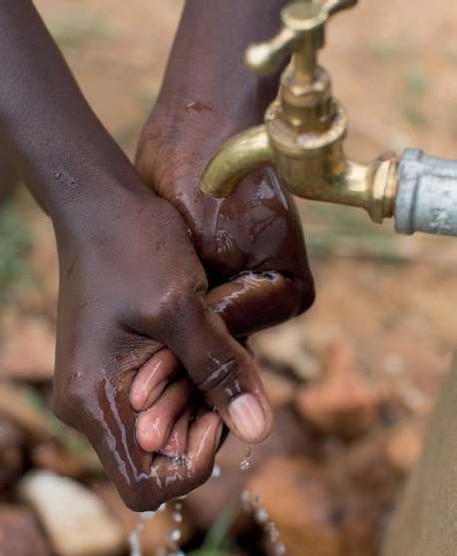
Hygiene education is a vital part of Toilet Twinning’s three pronged approach.
Photo: Ralph Hodgson / Toilet Twinning
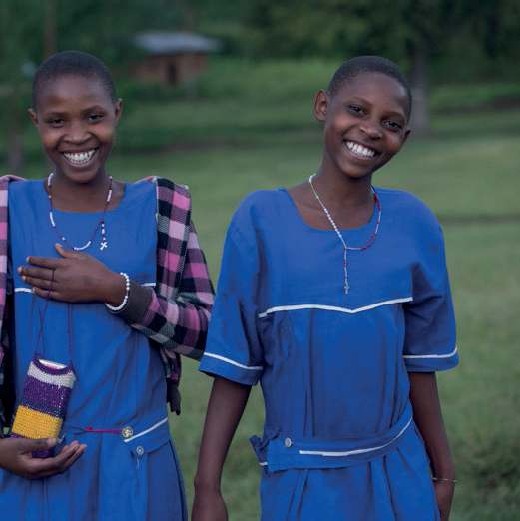
Installing toilets in schools can reverse dropout rates, especially for girls.
Photo: Ralph Hodgson / Toilet Twinning
Christian Aid and AquAid have been working together for over 20 years to provide clean and safe drinking water for people in Africa.
“Christian Aid and AquAid have been working together for over 20 years to provide clean and safe drinking water for people in Africa. It was a priority for AquAid’s founder and CEO Paul Searle that through the establishment of the AquAid franchise, his company could not only provide clean and accessible water to communities and workplaces here in the UK but that they could also ensure that communities across Africa had improved access to clean water. AquAid have donated over £3.4 million to Christian Aid since the relationship began in 1998 with donations being made both when customers purchase watercoolers and with each subsequent bottle of water they supply”, she explained.
“These funds have been used to support water related projects across Africa and currently support communities in both Ethiopia and Malawi to be able to access clean drinking water for themselves and their livestock. Both countries have seen the drastic effects of climate change which means access to water to drink, for livestock and to grow crops has become even more difficult for communities. Women and girls are particularly vulnerable as they are forced to walk miles each day in search of water and girls miss out on going to school.
“Our partnership with local programmes is vital. The community identifies what their needs are and they have a strong voice in developing any solutions.
“This partnership has always been really exciting to communicate to AquAid staff and customers – the link is so tangible in that by sourcing their watercoolers through AquAid they are not only providing clean, accessible water for their workplace or community but they are also helping those in extreme poverty access clean reliable water for themselves. They particularly like the sustainable approach that Christian Aid takes as it’s improving livelihoods not just simply giving a hand out.
“In Malawi AquAid is supporting smallscale farmers in the Salima District who currently face severe water issues. Despite being a lakeshore district, there is a shortage of portable water in Salima and a high prevalence of water borne diseases.
Farmers struggle to feed their children and pay for basics such as soap and school uniforms.
Using donations from AquAid, Christian Aid is supporting farmers in Salima to become more resilient to the impact of climate change by:
• increasing water supply for irrigation and household use
• implementing conservation agriculture technologies
• diversifying crops to include those that grow in more moist conditions
• improving crop production using irrigation schemes powered by solar energy.
In Ethiopia, Christian Aid works in the south of the country, which experienced a devastating drought in 2016 to provide water points for communities in South Omo. They have also ensured pastoralist communities have access to water for their livestock by helping to build the Kizo pond, which provides drinking water to more than 1.5 million animals, which helps 28 communities in two districts. The 2.7 million litres, man-made pond means that herdsmen from these communities – which sometimes include children as young as eight years old – no longer need to leave their homes for weeks on end to find water for themselves and their livestock.
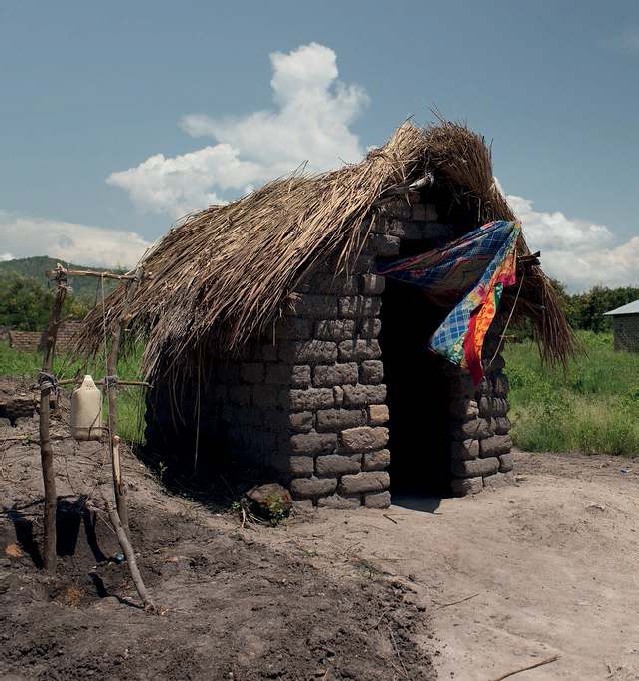
Even a simple pit latrine such as this one in South Kivu, DRC, can save lives.
Photo: Ralph Hodgson / Toilet Twinning
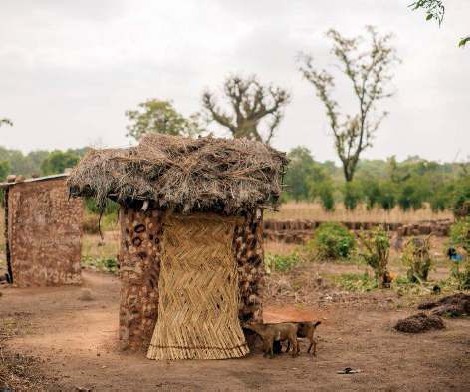
Toilet Twinning encourages families to build their own toilets, such as this one in Ivory Coast.
Photo: Tom Price / Toilet Twinning
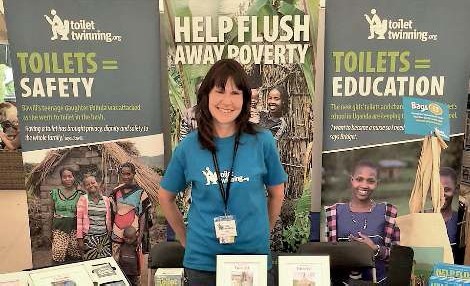
Elyse Kirkham, Toilet Twinning Fundraising Manager for Scotland, at the Refuel Christian festival.
Credit: Toilet Twinning
Thanks to the support of AquAid customers, together these two projects in Malawi and Ethiopia will help 14,000 people to get access to the clean water they need to stay healthy and build better lives for themselves”, she said.
Christian Aid has accompanied a number of AquAid staff to see the difference they’re making first hand. Meeting and listening to the communities can be really transformative for our supporters especially when they can see the difference that the support of AquAid is making to people’s lives.
In 2017, an AquAid team travelled 7,000 miles from Scotland to Malawi to see first-hand the life-changing work by Christian Aid that you’ve made possible.
Here’s what the team said about their once-in-a-lifetime experience: ‘After our arrival in Lilongwe, the capital of Malawi, Christian Aid took us to Lake Malawi in the Salima district. There we visited a community of smallholder farmers whose crops are now at huge risk every year as rainfall becomes increasingly erratic because of climate change.
‘Severe land shortages in this densely populated country give the farmers no choice but to cultivate their small fields again and again. The soil doesn’t have enough time to recover, which leads to low fertility and very poor harvests. Now drought is putting the land under even more stress. The farmers struggle to make a living, so it’s difficult for them to pay for basics such as soap and school uniforms, or even to feed their children. ‘We all had an amazing trip, one that will be with us forever. To see first-hand what the irrigation scheme and water pump has given to these local communities in Malawi was just wonderful.’
“It’s easy to get involved”, Helen says. “By choosing AquAid as your water cooler company, you’re helping people living in poverty all over the world to access clean water and build healthy lives. If you purchase an AquAid water cooler for your local church, school or place of work, AquAid will donate £50 for each new cooler ordered. ‘Every water cooler we install raises enough money to bring two children water for the rest of their lives.’
‘For further information call 01223 508109 or visit www.aquaidwatercoolers.co.uk/50to christianaid